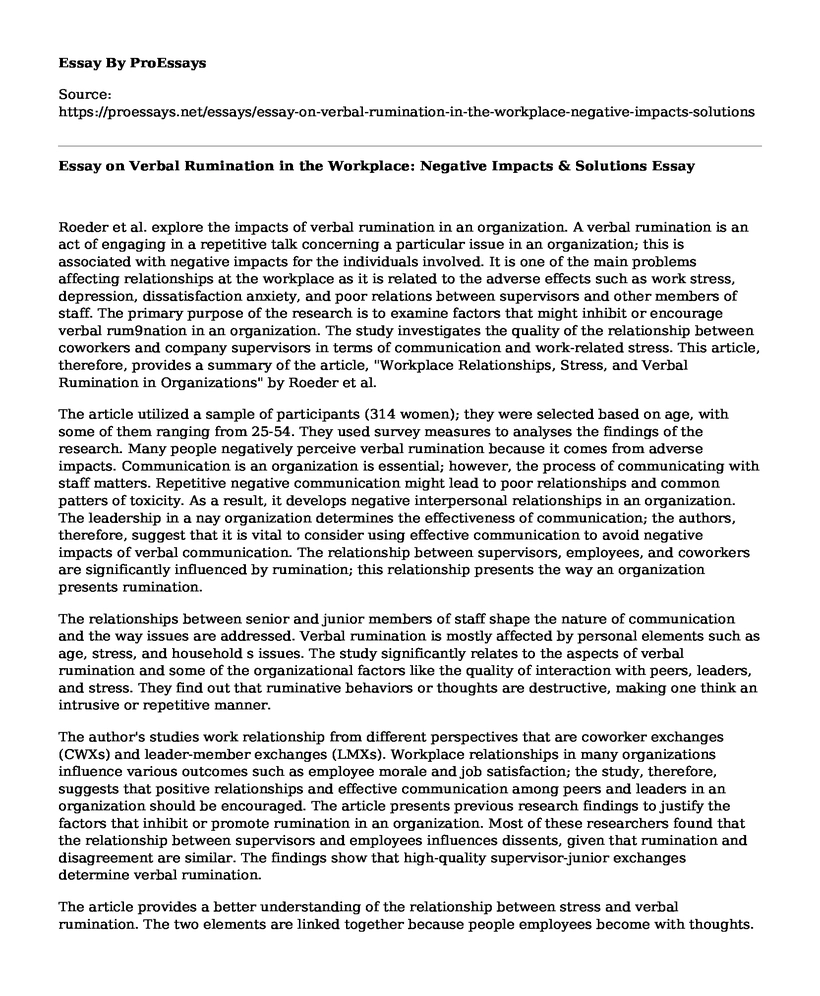Roeder et al. explore the impacts of verbal rumination in an organization. A verbal rumination is an act of engaging in a repetitive talk concerning a particular issue in an organization; this is associated with negative impacts for the individuals involved. It is one of the main problems affecting relationships at the workplace as it is related to the adverse effects such as work stress, depression, dissatisfaction anxiety, and poor relations between supervisors and other members of staff. The primary purpose of the research is to examine factors that might inhibit or encourage verbal rum9nation in an organization. The study investigates the quality of the relationship between coworkers and company supervisors in terms of communication and work-related stress. This article, therefore, provides a summary of the article, "Workplace Relationships, Stress, and Verbal Rumination in Organizations" by Roeder et al.
The article utilized a sample of participants (314 women); they were selected based on age, with some of them ranging from 25-54. They used survey measures to analyses the findings of the research. Many people negatively perceive verbal rumination because it comes from adverse impacts. Communication is an organization is essential; however, the process of communicating with staff matters. Repetitive negative communication might lead to poor relationships and common patters of toxicity. As a result, it develops negative interpersonal relationships in an organization. The leadership in a nay organization determines the effectiveness of communication; the authors, therefore, suggest that it is vital to consider using effective communication to avoid negative impacts of verbal communication. The relationship between supervisors, employees, and coworkers are significantly influenced by rumination; this relationship presents the way an organization presents rumination.
The relationships between senior and junior members of staff shape the nature of communication and the way issues are addressed. Verbal rumination is mostly affected by personal elements such as age, stress, and household s issues. The study significantly relates to the aspects of verbal rumination and some of the organizational factors like the quality of interaction with peers, leaders, and stress. They find out that ruminative behaviors or thoughts are destructive, making one think an intrusive or repetitive manner.
The author's studies work relationship from different perspectives that are coworker exchanges (CWXs) and leader-member exchanges (LMXs). Workplace relationships in many organizations influence various outcomes such as employee morale and job satisfaction; the study, therefore, suggests that positive relationships and effective communication among peers and leaders in an organization should be encouraged. The article presents previous research findings to justify the factors that inhibit or promote rumination in an organization. Most of these researchers found that the relationship between supervisors and employees influences dissents, given that rumination and disagreement are similar. The findings show that high-quality supervisor-junior exchanges determine verbal rumination.
The article provides a better understanding of the relationship between stress and verbal rumination. The two elements are linked together because people employees become with thoughts. Consequently, they may have to talk about some of the issues repetitively to relieve them from stress. The results of the study reveal that the connections between coworker communications, verbal rumination, impacts the quality of workplace relationships.
Conclusion
In my opinion, this article presents credible information about verbal rumination and workplace relationships. Relationships between employees and supervisors are essential. There are many frameworks that one can use this article in an organizational context to solve some of the problems associated with communication. Learning from this article can help one to participate in solution-focused interactions with individuals involved in rumination to solve issues instead of letting a continuous cycle. At the level of interpersonal relationships, this article helps encourage members of an organization to seek guidance and mentorship from members who have a better experience or older individuals.
Works Cited
Roeder, Arden C., Johny T. Garner, and Kristen Carr. "Workplace Relationships, Stress, and Verbal Rumination in Organizations." Southern Communication Journal Vol.85.2 (2019):, p.63-72. Retrieved from: https://www.researchgate.net/profile/Arden_Roeder/publication/337718876_Workplace_Relationships_Stress_and_Verbal_Rumination_in_Organizations/links/5e36d1f9458515072d78acd6/Workplace-Relationships-Stress-and-Verbal-Rumination-in-Organizations.pdf
Cite this page
Essay on Verbal Rumination in the Workplace: Negative Impacts & Solutions. (2023, Jul 18). Retrieved from https://proessays.net/essays/essay-on-verbal-rumination-in-the-workplace-negative-impacts-solutions
If you are the original author of this essay and no longer wish to have it published on the ProEssays website, please click below to request its removal:
- Opportunities Raised By Change Management in Manufacturing Companies after Acquisition in Europe and Integration Into UK
- Innovations in Social Investments and its Future, Essay Example
- Spending Time in the Urgent and Important Quadrant: Time Management Essay
- Disney and 21st Century Fox Companies Analysis Paper Example
- John McKenzie Biography
- Essay Sample on Leaders: Using 4 Frames to Solve Complex Situations
- Agenda Setting and Framing - Essay Sample







